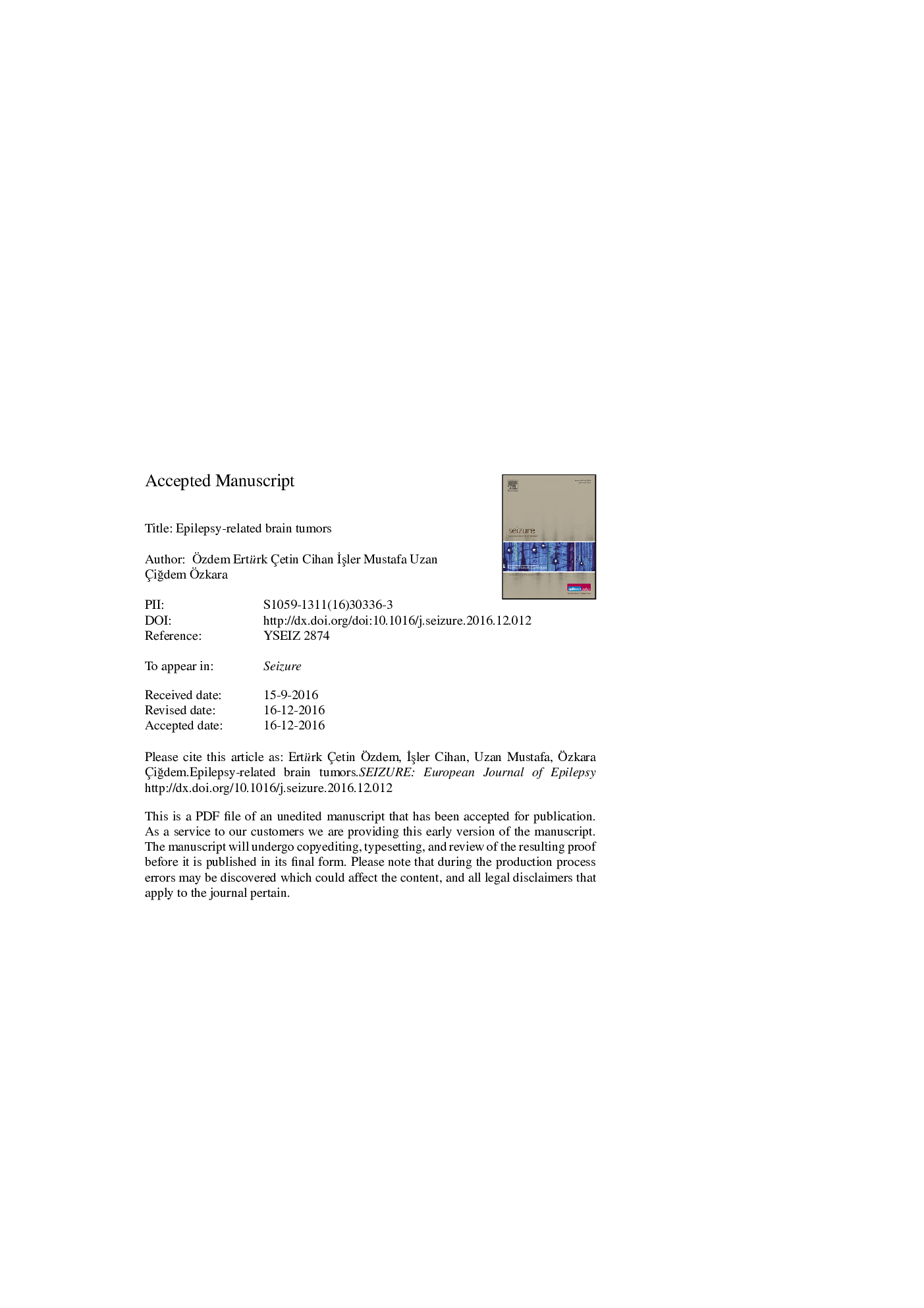| کد مقاله | کد نشریه | سال انتشار | مقاله انگلیسی | نسخه تمام متن |
|---|---|---|---|---|
| 4935522 | 1434222 | 2017 | 18 صفحه PDF | دانلود رایگان |
عنوان انگلیسی مقاله ISI
Epilepsy-related brain tumors
ترجمه فارسی عنوان
تومورهای مغزی مرتبط با صرع
دانلود مقاله + سفارش ترجمه
دانلود مقاله ISI انگلیسی
رایگان برای ایرانیان
کلمات کلیدی
صرع، تومورهای مغزی، تومورهای نورولوژیک، گلیومس، گلیوبلاستوما، مننژیوم، عمل جراحی،
ترجمه چکیده
تشنج در میان رایج ترین تومورهای مغزی است. انواع مختلف تومور می تواند باعث تشنج در نرخ های مختلف شود. تومورهای نورولوژیک و گلیوما شایعترین آنها هستند. تومورهای مغزی دومین شایع ترین علت صرع جدی فاجعه فکری در سریال جراحی صرع هستند. بیشترین فراوانی تومورهای نوروپاتیلیال دیسمبوپلاستیک و گانگلیوژلیوم هستند. مدیریت تشنج بخش مهمی از درمان بیماران مبتلا به تومورهای مغزی است. این بررسی در مورد ویژگی های بالینی و مدیریت تشنج در بیماران مبتلا به تومورهای مغزی، از جمله تومورهای نورولوژیکی، گلیوما، مننژیوم و متاستاز، بحث می کند؛ با کمک داده های ادبیات اخیر. تشنج مرتبط با تومور تشنج کانونی با یا بدون تعمیم ثانویه است. تشنج ممکن است به عنوان علائم اولیه یا در طی دوره بیماری رخ دهد. صرع مربوط به تومورهای مغزی می تواند به داروهای ضد صرع مقاوم باشد و درمان تومور گام اصلی نیز برای درمان تشنج است. جراحی اولیه و میزان حذف تومور، عوامل مهمی در دستیابی به آزادی تشنج به ویژه در تومورهای نورولیال و گلیوما کم است. در طول انتخاب داروهای ضد صرع مناسب، رویکرد کلی به صرع جزئی ممکن است دنبال شود. عوامل متعددی بر روی اپیلتوژنز در صرع مربوط به تومور مغزی وجود دارد که همچنین عدم همبستگی بالینی صرع در میان انواع تومور را توضیح می دهد. شناسایی مارکرهای مولکولی ممکن است رویکردهای درمانی آینده را هدایت کند و مطالعات بیشتری برای اثبات اثرات ضد توموری داروهای ضد صرعی ضروری است.
موضوعات مرتبط
علوم زیستی و بیوفناوری
علم عصب شناسی
علوم اعصاب رفتاری
چکیده انگلیسی
Seizures are among the most common presentations of brain tumors. Several tumor types can cause seizures in varying rates; neuroglial tumors and the gliomas are the most common ones. Brain tumors are the second most common cause of focal intractable epilepsy in epilepsy surgery series, with the highest frequency being dysembryoplastic neuroepithelial tumors and gangliogliomas. Seizure management is an important part of the treatment of patients with brain tumors. This review discusses clinical features and management of seizures in patients with brain tumors, including, neuroglial tumors, gliomas, meningioma and metastases; with the help of recent literature data. Tumor-related seizures are focal seizures with or without secondary generalization. Seizures may occur either as initial symptom or during the course of the disease. Brain tumors related epilepsy tends to be resistant to antiepileptic drugs and treatment of tumor is main step also for the seizure treatment. Early surgery and extent of the tumor removal are important factors for achieving seizure freedom particularly in neuroglial tumors and low grade gliomas. During selection of the appropriate antiepileptic drug, the general approach to partial epilepsies can be followed. There are several factors influencing epileptogenesis in brain tumor-related epilepsy which also explains clinical heterogeneity of epilepsy among tumor types. Identification of molecular markers may guide future therapeutic approaches and further studies are needed to prove antitumor effects of different antiepileptic drugs.
ناشر
Database: Elsevier - ScienceDirect (ساینس دایرکت)
Journal: Seizure - Volume 44, January 2017, Pages 93-97
Journal: Seizure - Volume 44, January 2017, Pages 93-97
نویسندگان
Ãzdem Ertürk Ãetin, Cihan Ä°Åler, Mustafa Uzan, ÃiÄdem Ãzkara,
